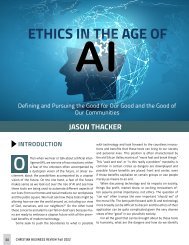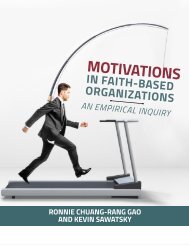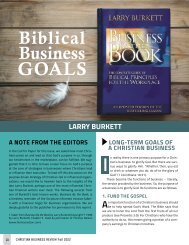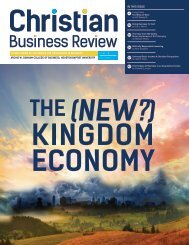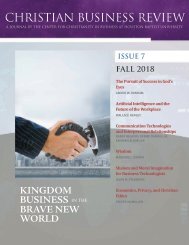Christian Business Review 2022: Pressing On Toward God's Goal
You also want an ePaper? Increase the reach of your titles
YUMPU automatically turns print PDFs into web optimized ePapers that Google loves.
MOTIVATIONS IN FAITH-BASED ORGANIZATIONS<br />
CBR PEER-REVIEWED ARTICLES<br />
ABSTRACT<br />
This paper fills a gap in research on job satisfaction<br />
and motivational factors in faith-based organizations.<br />
Drawing on motivational theories, we present<br />
a conceptual model that hypothesizes the effects of<br />
three factors (personal faith, perceived fit between<br />
personal faith and organizational faith, and transformational<br />
leadership [TL]) on job satisfaction and the<br />
mediating effects of motivation. A statistical analysis<br />
of survey data from four <strong>Christian</strong> institutions of<br />
higher learning in Canada concluded that personal<br />
faith is positively related to job satisfaction, but only<br />
among employees high in perceived fit. We also confirm<br />
that motivation fully mediates the relationship<br />
between perceived fit and job satisfaction. In addition,<br />
TL has a direct effect on job satisfaction and an<br />
indirect effect through the partial mediation of motivation.<br />
Managerial implications of these findings are<br />
also discussed.<br />
INTRODUCTION<br />
N<br />
ehemiah is often viewed as a Biblical example<br />
of transformational leadership. He faced<br />
seemingly insurmountable, complex problems,<br />
while dealing with difficult people, yet was able<br />
to effectively motivate the team around him<br />
to achieve a vast rebuilding project. While the project was<br />
successful due to God’s providence, it was also successful<br />
because Nehemiah understood the factors that motivated<br />
the people with him. He understood the yearning to correct<br />
the historical disgrace from captivity and a destroyed Jerusalem<br />
(Nehemiah 4:17). Nehemiah understood the need for<br />
hope and the desire of his team to improve the future for<br />
their families (Nehemiah 4:14). He understood the economic<br />
challenges demotivating some of the people (Nehemiah 5).<br />
Similarly, successful leaders of modern faith-based organizations<br />
(“FBO” or “FBOs”) must understand their employees<br />
and the factors that motivate them. It is surprising, that<br />
while much has been written with respect to motivational<br />
factors in corporations, little exploration has been done with<br />
respect to such factors in FBOs. In this research, we seek to<br />
begin this exploration by examining the effectiveness of just<br />
three motivational factors within the context of FBOs: employees’<br />
personal faith, the perceived fit between personal<br />
and organizational faith, and transformational leadership.<br />
First, does personal faith itself make employees more satisfied<br />
with their jobs? If so, will motivation mediate this relationship?<br />
In other words, will stronger personal faith lead to<br />
higher employee motivation levels, which in turn will result in<br />
higher job satisfaction? Although research in organizational<br />
behavior has examined personal faith, this has largely been<br />
in the general work environment. Remarkably, we could not<br />
identify research that has explored the link between personal<br />
faith and job satisfaction and the possible mediating effect<br />
of motivation in FBOs.<br />
The second motivational factor examined is the perceived<br />
fit between personal faith and organizational faith. This is a<br />
new construct introduced in this study, which we define as<br />
the extent to which an employee perceives personal faith as<br />
consistent with that of the organization. Employees in FBOs<br />
often share the same religion but are not necessarily from<br />
the same sub-group within that religion and thus may have<br />
considerably different beliefs and practices. For example,<br />
<strong>Christian</strong>ity comprises six major groups: Church of the East,<br />
Oriental Orthodoxy, Eastern Orthodoxy, Roman Catholicism,<br />
Protestantism and Restorationism. Protestantism alone includes<br />
many denominations that have diverging beliefs and<br />
practices, such as Adventism, Anabaptism, Anglicanism,<br />
Baptists, Lutheranism, Methodism, Moravianism, Pentecostalism,<br />
and Reformed <strong>Christian</strong>ity. 1 Organizations may also<br />
have varying commitment levels to the beliefs and practices<br />
of the religious sub-group they are affiliated with. Some may,<br />
therefore, perceive a high level of fit between their personal<br />
faith and the faith of their employer, while others perceive<br />
a low level of fit or no fit at all. Will the different levels of<br />
perceived fit lead to different levels of job satisfaction? If so,<br />
will motivation mediate this relationship? Again, no previous<br />
research seems to have examined these possible effects.<br />
Third, considering the proposed motivating effects of<br />
personal faith and perceived fit, we examine if transformational<br />
leadership still impacts motivation and job satisfaction<br />
in FBOs. Prior research confirms the strong relationship<br />
between transformational leadership and job satisfaction in<br />
secular organizations. 2 However, in FBOs, where people generally<br />
put God ahead of leaders, will the normal link between<br />
transformational leadership and job satisfaction still exist? If<br />
so, will motivation also mediate this relationship?<br />
CHRISTIAN BUSINESS REVIEW Fall <strong>2022</strong> 232




